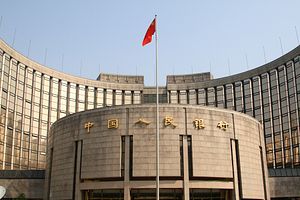China’s central bank recently removed quotas on investment in China’s bond market by foreign financial bodies, including central banks, sovereign wealth funds, and non-governmental financial institutions. Once they register with the central bank, these institutions will be able to freely trade bonds, interest rate swaps, and repurchase agreements on the interbank market, China’s main onshore bond trading platform. Bond instruments available for purchase or sale include government bonds, central state-owned enterprise bonds, and non-government corporate bonds, which are all listed on either stock exchanges or the interbank market, and policy bank bonds, which are only traded on the interbank market.
The interbank bond market is worth $5.7 trillion, representing about half of China’s 2014 GDP. The PBOC is attempting to expand trading in the interbank market. Although commercial banks are the main bond holders in the interbank market, followed by insurance companies and domestic funds, the central bank has recently begun to permit rural commercial banks, trusts, asset management affiliates of securities brokers, and large private investment funds to trade in the interbank market. Long-term government bond yields are down from 2014, reflecting monetary policy directed at decreasing long-term rates and a rise in bond demand resulting from the stock market downturn.
Hoping to boost demand for its bonds, China has also been allowing more foreign institutional investors to trade on its interbank market. Foreign participation is permitted through the Qualified Foreign Institutional Investor (QFII), Renminbi-Qualified Foreign Institutional Investor (RQFII), and PBOC Interbank Investment programs. Allowing national and supra-national bodies to trade more freely on the interbank market will boost demand; more importantly, it may increase holdings of RMB bond instruments as reserves.
The move to eliminate quotas on interbank trading by national and supranational bodies is a small step toward opening up the bond market and the capital account, but much more will need to be done to truly develop China’s financial markets. Essential reforms require better ratings of bonds, particularly corporate bonds, and better provision of information, as well as greater issuance. Bonds must become more liquid, OTC trading must be expanded, and the investor base must become more diversified.
For the financial sector as a whole, interest rates must also fully reflect market forces, and financial institutions must be strengthened if the capital account is opened and they must stand up to a surge in competition. For the RMB to become a true reserve currency, it must be fully convertible such that the capital account must be opened; in the latter there is a long way to go.
Underscoring China’s underdeveloped financial markets is the recent roller coaster ride that just took place in the stock market, as asset prices took a plunge. As in other instances of financial instability, China’s government took the lead to bail out the stock market, inducing large state-owned banks to lend to the China Securities Finance Corp to help finance brokerages. Financial progress appears to be inching forward, even as the government stands ready to bail out markets.

































